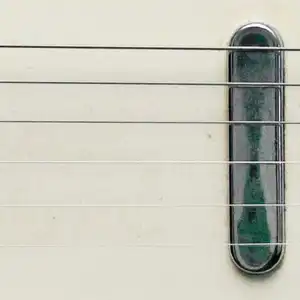How Often Should You Change Your Guitar Strings?


Be sure to subscribe to our YouTube channel to keep up with more great videos like this one:

Transcription
What's up, everybody? I'm Scott from Stringjoy Guitar Strings in Nashville, Tennessee, and today we're talking a little bit about how often you should change your guitar strings. Or, we would be talking about that if I knew you, and knew what your sweat was like and how often you played and what your needs were and all that sort of good stuff. But since I probably don't, unless we've talked personally, instead, we're going to talk about a general range of how often players change their strings, whether you should be changing your strings more often than you do, and also a couple things that you can do to be able to change your strings a little bit less often than you do. There are many facts of life, and one of them is that your guitar strings are going to age over time. This depends on a lot of different factors; the alloys in your guitar strings, how well they're made or how well they're wound, what your sweat is like, what the humidity is outside, how well you clean your guitar, on and on and on and on, there's a ton of different factors that can determine how long your strings will last. Ultimately, when it comes to how often you like to change your guitar strings, it has a lot more to do with tone than anything else. Some players like darker, warmer tone out of their guitar. Personally, with my bass, I don't change my strings often at all because I really like a really meaty, thumpy sort of tone. Bright strings, I actually don't think sound very good on my bass. Again, that's just me. A lot of bassists feel totally opposite, but that's the beautiful thing about guitar—we're all a little bit different. A lot of players that like really, really snappy, bright tone have to change their strings a lot more often just because that's the tone guitar strings have when you first put them on. But, it wears down a little bit over time, things get a little bit more mellow sounding, and if you find yourself really missing that bright, snappy tone that you get at the beginning of a set of strings, you're going to need to change them more often in order to keep your guitar sounding the way you want it to. Guitarists are all different, and the range at which people change their strings varies about as widely as you could imagine. There are some players that change their strings every single day, usually these are pros; touring guitarists that have a guitar tech employed full time, and you know what? They've got to make good use of that guitar tech that works for them, so they change their strings every single gig. It's also pretty good insurance to ensure that you're not going to have a string that's going to break or anything like that. Most guitarists really don't want to have to change their strings every single day. That would be a little bit ridiculous. I, for example, would absolutely hate it if every time I had to play my guitar, I had to put on a new set of strings first. Most players don't do it quite that often. I would say the earlier range of most casual or semi-professional players, it's about once every week or once every two weeks. And then you have some players that play an awful lot that will wait every six weeks or even every three months. That's a pretty normal range that I think most players fall into, again, depending on your sweat, the climate your guitar is in and all those tons of different factors that I listed out earlier. While that is the general range for most players, there are a lot of players that might go way, way longer, and I've even done it myself. Some people don't like to change their strings on their acoustic guitar, but once a year. Some players that don't really play their guitar very much at all, or are more new to guitar and don't really play very often, will go as long as two years or three years. I wouldn't generally recommend doing that, but it is possible. People have done it, and if you really, really take good care of your strings, or keep your guitar in a case and don't play it very often, there's no reason why shouldn't be able to hold up for that long. Again, that's a very specific case. For most players, that play their guitar pretty often, you're definitely going to want to change your strings a lot more often than that. One question I get a lot is whether there's anything wrong with just changing your strings once one of your strings breaks. It depends on your circumstance, but there isn't necessarily anything wrong with doing that. If you're playing in your bedroom, or you're not playing gigs very often, or you just really like the sound of woolier, warmer, worn in strings, I don't see anything wrong with just playing a set of strings until one of them finally gives out. That said, if you're the type of player that likes a little bit of a brighter tone, or if you play gigs a lot, and really don't want to end up breaking a string while you're on stage, it probably makes sense to change your strings a little bit more proactively and try to get ahead of that very final point, at which one of them will finally break. Another question I get a lot is whether there's anything wrong with just changing the one string that does break, and leaving the rest of the set as is. Again, this depends a little bit on your circumstance. If you really don't care very much about the tone of your guitar or it sounding a little bit uneven, or again if you're a beginner and it's just all new to you, there's not necessarily anything wrong with it. But, in general, I would highly recommend taking all the strings off your guitar and putting on a fresh set. There are a few different reasons for that. One is that it's a really great opportunity to clean your guitar, wipe down your fretboard, ensure that you're not building up any gunk or anything like that on your guitar. Another is that it's just going to sound a lot more natural. Strings do have a change in tone over time, like we've talked about. As a result, if you change one of them and leave the rest of the set the same, you're going to find that your strings sound a little bit uneven and that newer string you put on really rings out when you play a chord, and it doesn't really fit just right in the set. The only exception to that would be if you just put a set of strings on. Let's say you had some bad luck and a string broke at the tuning peg or at the bridge, or something like that. There's nothing wrong in that case with taking a string out of another set and throwing it on. They've only been on your guitar for a few minutes or a few hours. They haven't really changed in tone that much, and that new string's going to catch up with them really quickly. In that circumstance, there's nothing wrong with it at all. But, if you've been playing the set of strings for a long, long time, that's where you're going to see things sound a little bit uneven if you put a brand new string on at just one position. Should you change your strings more often than you currently do? It just depends on you. A lot of companies would obviously tell you that they want you to change your strings as often as possible. The more you're buying guitar strings, the more strings we're selling. At the same time, I think a well-crafted string can last for a long time. I think a lot of players don't really give their strings the amount of care that they deserve. If you're taking care of your guitar, wiping down your strings, doing all that sort of good stuff, your strings can last you a long time. Again. They're really well made if you're getting quality strings like the strings that we sell, and I really think that people should take the time to take care of them and get a long-lasting tone out of their strings. What if, like a lot of players, you want to change your strings less often than you currently do? There's a number of different options for you. Obviously, coated guitar strings have been around for a while. You won't have to change coated strings quite as often as uncoated strings. Unfortunately, the drawback is that that coating, that Teflon coating on top of strings is going to weight them down. They're not going to resonate the same way, they're not going to sound nearly as bright, they're going to sound quite a bit duller. If you're okay with that, coatings can be a really great way to get a lot more lifespan out of your strings, but most players, and especially serious players that are playing gigs or playing in studios find that the drawbacks tonally of coated strings aren't really quite worth that trade-off. The good news is there's a couple of really simple things you can do even with uncoated strings to get them to last a lot longer. One of the most basic things you can ever do is simply wipe down your guitar when you're done playing it. This works whether you're playing acoustic, bass, electric; really any instrument that uses strings. You're going to build up oils and sweat and acidity and all that sort of stuff on your strings when you're playing your guitar, and simply wiping down your strings down after you're done playing them can do a lot to make your guitar strings last a lot longer. Another solution for people that really want to get as much lifespan out of their strings as possible is to use a guitar string cleaner or a string conditioner. We sell an all natural string conditioner on our site, that I use all the time. I love it, it's made from all natural cranberries and it really does a great job of preventing corrosion and helping you get all that grime off of your strings. That said, of course, I love ours. I'm a little bit biased there. There's a lot of good products like that out there, and they'll all do a really similar thing of helping to insulate your strings from anything that can help corrode them, or just get the gunk off of them and make sure that they last a little bit longer for you. Another big thing that a lot of players don't talk about is if you're changing your strings all the time, just because you really do like that bright snappiness of a new set of strings, you can do a lot to get that brightness out of your rig in other places than your strings. You might have strings that you've been playing for a week or two, they've lost a little bit of that sharpness, that crispness that you get from a new set of strings, but your amp can do a lot. If you're just turning up the treble or turning up the presence. Or if you're playing a vox, or something like that that's very chimey. These things can go a long way. Even like an EQ pedal can do a lot. Just adding that top in somewhere else in your rig, especially watching it as your strings wear in a little bit, can help you get a lot of that same sound you get out of a new set of strings without having to change your strings every single gig. A lot of metal guys do it for that very same reason, and I think that really just being very open with the presence on your amp, or increasing your top end, can go a long way to giving you that sparkly tone of a brand new set of strings, without having to put them on every single day. So I really want to know how you guys feel about this. Do you change your strings every day? Every week? Every month? Every three months? Do you only change them once one string breaks? Do you have some guitars that you hardly ever change the strings on and others that you keep with fresh strings all the time? Leave us a comment down below. I'd love to hear from you.Other Posts you may like

Guitar Strings Order: How the Guitar is Tuned and Why

Two Handed Tapping: Our Top 8 Tappers of All Time

Which Guitar Strings Wear Your Fret Wire Down More?

What is Nashville Tuning? Its History, Best Guitar Strings & Uses

Guitar Scale Length Explained: String Tension & Playability

What Guitar Strings I Used To Play...
0 Responses
Leave a Reply
Your email address will not be published. Required fields are marked *

